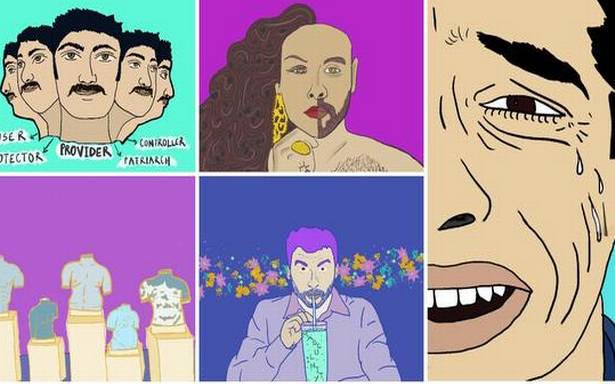With her latest podcast, ‘What’s a Man’, Deepa Narayan explores the various facets of being male today
There are different lenses through which one can view masculinity in India, but one of the more straightforward ones is Bollywood, that reliable barometer of public sentiment. In the ’50s and the ’60s, the typical hero was a stoic figure, coping with his (and, metaphorically, the country’s) lack of resources, never showing a sign of weakness or visible vulnerability. Stoic silence soon gave way to red-hot rage: the era of Amitabh Bachchan and the ‘angry young man’ gave the average Joe a certain license to explode. And now, finally, we have heroes who aren’t afraid to cry: Vicky Kaushal’s famous weeping scene in Masaan and Ranbir Kapoor’s many teary moments across the last decade, are a few examples.
Deepa Narayan | Photo Credit: Special Arrangement
Manhood in the making
“More often than not, men are encouraged to keep their emotions to themselves,” says Deepa Narayan in one of the first episodes of her podcast, What’s a Man. For this 10-episode series, Narayan — who worked for the World Bank for over 20 years — and her team interviewed hundreds of middle and upper-class boys and young men, not to mention prominent men from different walks of life — including Retired General HS Panag, author Amish Tripathi, comedians Abish Mathew and Neville Shah, among others. Narayan, who has also been a senior adviser in the Poverty Reduction and Economic Management group from 2003-2008, is no stranger to how gender dynamics have a ripple effect on the economy. Countries where the wage gap is larger take that much longer to lift out of poverty, for example. In What’s a Man, therefore, she tries to connect the dots between ‘masculine’ modes of thought and action, and how these ways of thinking influence larger societal structures and hierarchies.
Voices from the podcast
- “I tell my children and my mentees that in order to be respected, you have to earn respect and give it as well. It cannot be a one-way street” – Devraj Sanyal, Managing Editor and CEO, Universal Music Group
- “Men are very pampered [in society], which makes them feel special. There’s a certain value still attached to being a man. But there are also other parts of him that feel very confused, depressed or weak. They are not allowed to be vulnerable” – Dr Ashis Roy, psychoanalyst and faculty at Ambedkar University
Masculinity is a fraught topic in India, it has to be said. When people are not fixating on the physical attributes of political leaders (‘looks too old to be a youth leader’, etc) they are projecting their preferences on to their children. Male CEOs and Bollywood stars know that uploading a post-workout selfie on social media will win them a new legion of admiring young people. The film Gully Boy gave us the dictum ‘bohot hard’, meaning fierce or formidable in a typically masculine way. The super-popular comedian Zakir Khan has cultivated a persona called ‘sakht launda’ (‘strict lad’, literally). From a young age, little boys know that there’s a certain set of physical and behavioural traits considered desirable in a man — and a corresponding, mutually exclusive set for a woman.
(from left) Devraj Sanyal, Paromita Vohra, and Neville Shah | Photo Credit: Special Arrangement
Fighting the persona
The interview responses that Narayan and her team (students from Ashoka University) elicited from children are worth listening to at length. For most kids, being a ‘powerful man’ meant being physically strong, with prominent muscles, essentially a real-life Marvel superhero without supernatural abilities. “Your parents aren’t your only source of information when you’re seven or eight years old,” says Narayan, adding, “In fact, they’re arguably not the most important source. A lot depends upon their teachers and classmates. Children are a quick study and they figure out which attitudes are likely to be rewarded by society.”
Voices from the podcast
- “I was the kind of unsympathetic, insensitive, stereotypical man who thought he could live his whole life on testosterone alone. I used to think people who go to therapy are weak-willed, ‘how can you not control your emotions’, et cetera” – Comedian Neville Shah
- “In our surveys and user-generated pieces, we found that men who had a relaxed [not shameful] relationship with the body also had quite positive sex lives” – Paromita Vohra, filmmaker and founder of Agents of Ishq
Remember Dhara Oil’s TV ad from the 1990s, where the little boy and girl fawn over their super-dad? He plays cricket with them, attends their school functions dutifully, and he’s always quick to jump to the next high-energy endeavour. It’s a heart-warming ad, but remember that even this ad ended with the words, ‘My Daddy strongest!’, coupled with the father lifting his kids into his arms. ‘Strength’ is hard-coded into children’s brains; what we can do with the help of podcasts like What’s a Man? is to expand their idea of strength, to go beyond the merely physical, as it were.
Source: Read Full Article


